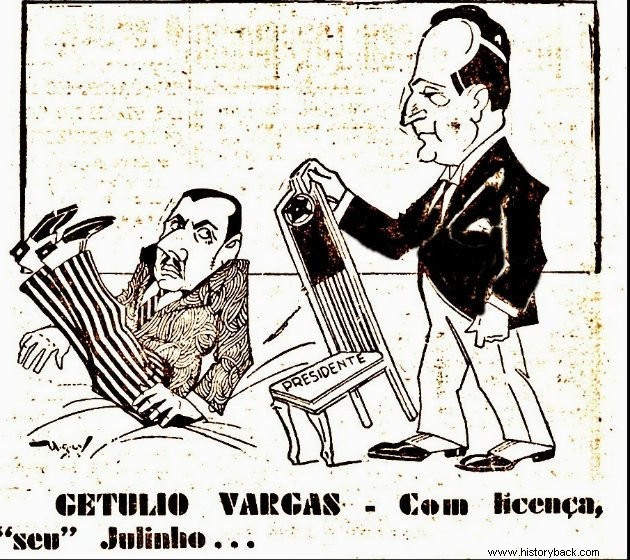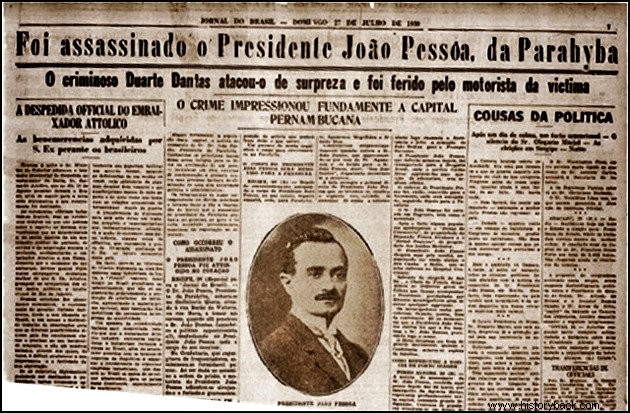The Revolution of 1930 It was a coup that deposed President Washington Luís on October 24, 1930.
The movement was organized by the states of Minas Gerais, Paraíba and Rio Grande do Sul and prevented the inauguration of president-elect Júlio Prestes, on the grounds of electoral fraud.
The popular displeasure due to the 1929 economic crisis and the assassination of the Paraíba politician João Pessoa also contributed to the movement.
Historical Context
Until 1930, politics in Brazil was conducted by the oligarchies of Minas Gerais and São Paulo, through fraudulent elections that kept the country under an agro-export economic regime.
The elites from São Paulo and Minas Gerais alternated the presidency of the Republic, electing candidates who defended their interests. This political system became known as the "coffee with milk policy" or governors' policy.
The model worked until the other Brazilian states grew in importance and claimed more space in the Brazilian political scene.
On the other hand, the Crisis of 1929 hit the Brazilian economy, causing unemployment and financial difficulties.
The fact that Brazil is a coffee monoculture country made the crisis deep, as exports of the product dropped dramatically. The economic crisis contributed to the climate of popular dissatisfaction with the Washington Luís government.
Equally, there was the discontent of low-ranking army officers, who wanted to overthrow the oligarchies and establish a new order in Brazil.
We must remember that the lieutenants had already shown their displeasure with the Brazilian political situation through episodes such as the Revolta do Forte de Copacabana or the Revolta Paulista of 1924.
See also:Coffee with Milk PolicyPresidential Elections of 1930
In early 1929, Washington Luís appointed the president of São Paulo, Júlio Prestes, as his successor. This measure was supported by the presidents of 17 provinces.
The appointment of Júlio Prestes broke with the alternation of powers between Minas and São Paulo, so Minas Gerais, Rio Grande do Sul and Paraíba did not support Prestes.

These provinces allied with opposition politicians and created the Liberal Alliance. Thus, the candidates of this group were the president of Rio Grande do Sul, Getúlio Vargas and, for vice, the president of Paraíba, João Pessoa.
Everything seemed to indicate the victory of Júlio Prestes and so it happened. In the elections held in March 1930, Júlio Prestes was elected with a large majority of votes (1,091,709), against 742,794 for Getúlio Vargas.
Faced with the results, the Liberal Alliance alleged fraud and rejected the validity of the elections.
João Pessoa assassination
Shortly thereafter, in July 1930, João Pessoa was murdered by the lawyer João Dantas (1888-1930) in Recife.
The crime is believed to have occurred for personal reasons and linked to Paraíba politics, but the death of the vice-presidential candidate has become a national issue.

Indignation takes over the country. Even without support, President Washington Luís did not intend to relinquish power.
Thus, on October 3, the military led by Getúlio Vargas, in the south, and Juarez Távora (1898-1975), in the north, converged on Rio de Janeiro.
Upon arrival in the capital, the Governing Board is formed by the three military ministers Tasso Fragoso, Mena Barreto and Isaías de Noronha.
In front of the military, Washington Luís declares that he would only leave office in prison or dead. Immediately, the Governing Board arrested him and took him to Fort Copacabana, where he would remain until November and from there he would leave for exile in Europe.
With that, Getúlio Vargas became head of the Provisional Government with broad powers, revoking the 1891 constitution and ruling by decrees. Likewise, he appointed his allies to interventores (governors) of the Brazilian provinces.
Provisional Government of Vargas
Getúlio Vargas' allies hoped that the new president would call general elections to form a Constituent Assembly, but the matter was always postponed.
Tired of waiting, several voices began to criticize the provisional government such as the communist party, the National Liberation Alliance, the Paulistas, etc.
In São Paulo, the movement demanding presidential elections and a Constitution is growing. Faced with the denial of the central government and the increase in police repression, the state of São Paulo declares war on the government in the episode that will be known as the 1932 Revolution.
See also:Constitutionalist Revolution of 1932Revolution or Coup?
The Revolution of 1930 was called that by its members. However, this is a coup and not a revolution.
A revolution has broad popular support, proposes and causes drastic changes when installed in power.
The coup d'état, on the other hand, is the removal of power through violence by a politician constitutionally elected or consecrated to that office.
The events of 1930 were a struggle for power between the elites, with a margin of victory for any one of them and that would change little in depth the Brazilian social structure.
See also:Military InterventionCuriosities
- Washington Luís would only return to Brazil in 1947. In turn, Júlio Prestes asked for asylum at the British consulate and would return in 1934.
- Three former ministers of Getúlio Vargas and three lieutenants from 1930 reached the Presidency of the Republic:Eurico Gaspar Dutra, João Goulart and Tancredo Neves (ministers); Castelo Branco, Emílio Medici and Ernesto Geisel (military).
- Getúlio had almost 100% of the votes in Rio Grande do Sul during the 30th election.
Read more :
- First Republic
- Tenentism
- Coronelismo
- Oligarchy
- Brazil Republic
- Governors Policy
- Era Vargas
- Exercises on the Vargas Era
